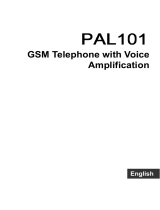11
Access Codes
.........................................................................
29
• PIN code (4 to 8 digits)
.........................................................
29
• PIN2 code (4 to 8 digits)
.......................................................
29
• PUK code (4 to 8 digits)
........................................................
29
• PUK2 code (4 to 8 digits)
......................................................
29
• Security code (4 to 8 digits)
..................................................
29
Accessing the Menu
Menu Tree
................................................................................
30
Messages [Menu 1]
.................................................................
32
• Write text message [Menu 1-1]
.............................................
32
• Write multimedia message [Menu 1-2]
.................................
34
• Inbox [Menu 1-3]
...................................................................
39
• Outbox [Menu 1-4]
................................................................
40
• Drafts [Menu 1-5]
..................................................................
42
• Listen to voice mail [Menu 1-6]
.............................................
43
• Info message [Menu 1-7]
......................................................
43
• Templates [Menu 1-8]
...........................................................
44
• Settings [Menu 1-9]
...............................................................
45
Call register [Menu 2]
..............................................................
50
• Missed calls [Menu 2-1]
........................................................
50
• Received calls [Menu 2-2]
.....................................................
50
• Dialled calls [Menu 2-3]
.........................................................
50
• Delete recent calls [Menu 2-4]
...............................................
50
• Call charges [Menu 2-5]
........................................................
50
• GPRS information [Menu 2-6]
...............................................
53
Profiles [Menu 3]
.....................................................................
54
• General [Menu 3-1]
...............................................................
54
• Loud [Menu 3-2]
....................................................................
54




















